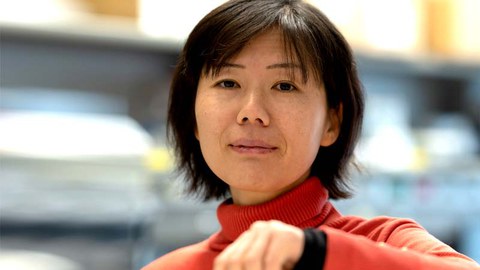May 16, 2023
Award-winning: Prof. Miki Ebisuya and the Stem Cell Zoo
Researcher of the Cluster of Excellence Physics of Life at the TU Dresden receives the Alexander von Humboldt Professorship
Kyoto, Barcelona, Dresden - Japanese biologist Miki Ebisuya has received honors in every country she has worked in. Following the Japanese Award for Excellent Young Researchers (2019) and an ERC Consolidator Grant (2020), she will be awarded the highest German research prize on May 11, 2023: the Humboldt Professorship. At TU Dresden, Ebisuya will pursue fundamental research questions about life as professor of Cell and Tissue Control. One of these questions has engaged her since childhood: what determines the big differences in the length of pregnancy in mice, elephants, and humans?
Comparing Embryos - The Challenge
In humans, pregnancy lasts nine months, in mice 20 days, and in elephants it takes almost two years: females of each species carry their offspring for different lengths of time. What determines the pace of biological development? Prof. Ebisuya investigates the molecular causes and physical principles behind this puzzle. However, to compare the embryos of different species, their prerequisites and living conditions - environmental factors, nutrients, body temperature - would first have to be standardized. That's a challenge.
Recreating animal tissues
Miki Ebisuya has found a new, creative solution to get to the bottom of her question: she designed a unique stem cell zoo. The research group leader and her team use an artificial biosystem made of modified cell cultures to study animal development. Pluripotent stem cells are used in the test tube - a special type that is not pre-programmed and can develop into any type of cell in an organism. This way 3D structures of tissue or organs that simulate a particular stage of development can be grown. These synthetic embryo tissues can be compared under identical culture conditions, allowing for the first systematic analysis of the adjusted developmental timing of different species, including humans.
World-class research at TU Dresden
"It is a great success for the TU Dresden to be able to welcome another Humboldt Professor," said Prof. Ursula Staudinger, Rector of the TU Dresden. "During the last three years, the Cluster of Excellence Physics of Life has been able to attract outstanding international scientists, including the world's leading scientist in Synthetic Biology." Managing Director and Speaker of PoL, Prof. Otger Campàs, also emphasizes the gain that Prof. Ebisuya represents for the Cluster of Excellence: "With her outstanding expertise in synthetic multicellular systems and optogenetics, Miki Ebisuya perfectly complements the existing approaches at Physics of Life. The many synergies between her group and other PoL groups will lead to innovative approaches to understanding the physical principles underlying biological self-organization. We are very happy to welcome her to Dresden."
Dresden biophysics and Japanese children's books
Interdisciplinary approaches to biological systems at TU Dresden take an internationally renowned position. Especially the Cluster of Excellence Physics of Life bridges the gap between physics and biology. Therefore, it was an easy decision for Prof. Ebisuya to come to Dresden: "Even when I lived in Japan, I knew the Dresden scientific community because of the many successful examples of collaborations between biology and physics. At the newly established Cluster of Excellence PoL, I want to further promote this kind of interdisciplinary cooperation and uncover the biophysical basis of species-specific features," she says. The esteemed researcher received the groundbreaking inspiration for her research in her teenage years by a popular science book: "There is this Japanese book, titled ‘Mouse Time and Elephant Time’. It explains the differences in developmental time between species, but it couldn’t explain why these differences exist. This question fascinates me, but it is still not known. So I dedicated my career to solve this puzzle."
About Prof. Miki Ebisuya
Miki Ebisuya obtained her PhD in her home country at Kyoto University in Japan in 2008, and subsequently became a research group leader there. After a stint at the Japanese research institute RIKEN in Kyoto, she joined the European Molecular Biology Laboratory (EMBL) as a group leader at its newly established location in Barcelona, Spain in 2018. She was awarded the Japanese Prize for Excellent Young Researchers in 2019 and an ERC Consolidator Grant in 2020. Miki Ebisuya has been awarded a Humboldt Professorship for the next five years, which will allow her to take up the position of Professor of Mechanisms of Cell and Tissue Control at the Technical University of Dresden in April 2023.
About the Alexander von Humboldt Professorship
The Alexander von Humboldt Professorship is the highest endowed research prize in Germany, with a value of up to five million euros. The aim of the Humboldt Professorship is to attract top researchers from abroad to Germany. The Humboldt Professorships are awarded for a period of five years by the Alexander von Humboldt Foundation and funded by the Federal Ministry of Education and Research. www.humboldt-foundation.de/en
About the Cluster of Excellence Physics of Life
Physics of Life (PoL) is one of three clusters of excellence at TU Dresden. It focuses on identifying the physical laws underlying the organization of life in molecules, cells, and tissues. In the cluster, scientists from physics, biology, and computer science investigate how active matter in cells and tissues organizes itself into given structures and gives rise to life. PoL is funded by the DFG within the framework of the Excellence Strategy. It is a cooperation between scientists of the TU Dresden and research institutions of the DRESDEN-concept network, such as the Max Planck Institute for Molecular Cell Biology and Genetics (MPI-CBG), the Max Planck Institute for the Physics of Complex Systems (MPI-PKS), the Leibniz Institute of Polymer Research (IPF) and the Helmholtz-Zentrum Dresden-Rossendorf (HZDR). www.physics-of-life.tu-dresden.de
Contact:
Kaori Nakashima
Science Communication Officer
Cluster of Excellence Physics of Life
Tel.: +49 351 463-41517

